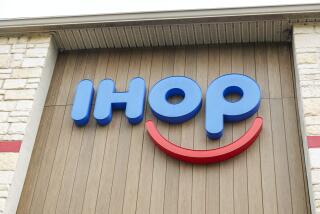DineEquity is filling up on franchisees
- Share via
DineEquity Inc. isn’t a name that would be familiar to most people, but they’ve probably eaten at one of the Glendale company’s well-known restaurant chains: Applebee’s and IHOP.
The first International House of Pancakes opened in 1958 in Toluca Lake, a family-friendly place that inspired the IHOP Corp. chain and introduced children to colored syrups and gooey, whipped-cream-covered chocolate-chip pancakes.
That company acquired the larger Applebee’s chain in 2007 and became DineEquity the following year. Applebee’s restaurants are meat-and-potatoes diners that serve alcohol, a key reason their sales outpace IHOP’s.
At the end of March, DineEquity had 2,031 Applebee’s and 1,589 IHOP restaurants in 17 countries. In the U.S., IHOP is in every state, and Applebee’s is in all except Hawaii.
The latest
Last year, DineEquity franchised 154 Applebee’s restaurants to become a 99% franchised company — a goal it set after the Applebee’s acquisition.
By franchising the restaurants to independent owners, the company reduced overhead and cash-flow volatility while increasing profit, Chief Executive Julia A. Stewart said. Franchisees pay DineEquity for the right to operate its branded restaurants, then return a portion of sales as royalties to the company.
The increased franchising enabled DineEquity to slash its employees to 2,450 last year from 32,300 in 2008. Five hundred employees are corporate workers, including 150 at the company’s Glendale headquarters.
One task the corporate employees handle is evaluating franchisee applicants. Stewart said her staff recently spent three days at an applicant’s Burger King franchise to secretly evaluate how he ran his business. They were impressed.
“We look for passion, we look for commitment, we look for entrepreneurship,” Stewart said. “We’re looking for somebody who will reinvest in the business.
“If you’re going to milk it, we’re not interested in working with you. It’s not a democracy; we give you lots of guidelines. We’re there to help you make lots of money, but we want something from you.”
Accomplishments
The increased use of franchising has significantly improved the company’s bottom line.
In 2008, DineEquity lost $154 million on revenue of $1.6 billion. Last year, the streamlined company turned a $122.5-million profit even though revenue fell to $850 million.
The company has reduced costs for both brands by consolidating purchasing and distribution, savings that “franchisees can pass on to the consumer,” Stewart said.
DineEquity’s stock is up more than 8% this year.
Challenges
The company recently reported mixed results for the first quarter as cost controls compensated for soft same-store sales, a key measure of financial health, said Will Slabaugh, an analyst at financial services firm Stephens Inc.
Slabaugh said the “uneven” economy was one cause of a slight decrease in first-quarter sales at Applebee’s. He recommended holding the stock and estimated its shares will reach $75 in 12 months, a slight uptick from its Friday close.
Another issue is the prevalence of restaurants offering breakfast options, which has created a challenge for IHOP.
“It’s certainly been a difficult time for IHOP because you have people coming from left and right,” Stewart said. “We’re still No. 1 in market share in family dining, and people have always loved us and thought of us first and foremost.”
Analyst views
Three analysts rate the stock as a buy, five as a hold and none recommend selling. They have an average 12-month target price for the stock of $77.80.
More to Read
Inside the business of entertainment
The Wide Shot brings you news, analysis and insights on everything from streaming wars to production — and what it all means for the future.
You may occasionally receive promotional content from the Los Angeles Times.











